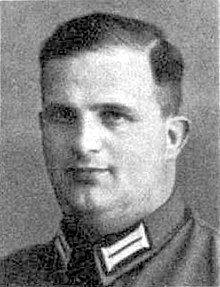Wilhelm Wigand
Wilhelm Wigand (born July 2, 1895 in Barth ; † unknown) was a German politician (NSDAP).
Live and act
After attending grammar school, from which he graduated from high school, Wigand took part in the First World War from 1914 to 1918 , in which he was awarded the Iron Cross 2nd class and promoted to NCO. From November 1918 to March 1920 he was in French captivity. He later attended lectures on history and German at various universities.
From 1922 to 1927, Wigand earned his living as a police officer.
At the end of the 1920s, Wigand joined the National Socialist German Workers' Party (NSDAP). In the party he initially took on tasks in the Sturmabteilung (SA). In the Reichstag elections in September 1930 , Wigand was elected to the Reichstag of the Weimar Republic as a candidate of the NSDAP for constituency 5 (Frankfurt an der Oder) . After his mandate was confirmed six times in elections in the following years - July 1932, November 1932, March 1933, November 1933, March 1936 and May 1938 - Wigand belonged to the German parliament for almost thirteen years from September 1930 until the end of the Nazi regime -Region in May 1945. One of the important parliamentary events in which Wigand was involved during his time as a member of parliament was the vote on the Enabling Act , which was passed, among other things, with Wigand's vote.
After the National Socialist " seizure of power " Wigand officiated among other things as district administrator of Luckau .
literature
- Joachim Lilla , Martin Döring, Andreas Schulz: extras in uniform: the members of the Reichstag 1933–1945. A biographical manual. Including the Volkish and National Socialist members of the Reichstag from May 1924 . Droste, Düsseldorf 2004, ISBN 3-7700-5254-4 .
- Erich Stockhorst: 5000 people. Who was what in the 3rd Reich . Arndt, Kiel 2000, ISBN 3-88741-116-1 (unchanged reprint of the first edition from 1967).
Web links
- Wilhelm Wigand in the database of members of the Reichstag
| personal data | |
|---|---|
| SURNAME | Wigand, Wilhelm |
| BRIEF DESCRIPTION | German politician (NSDAP), MdR |
| DATE OF BIRTH | July 2, 1895 |
| PLACE OF BIRTH | Barth |
| DATE OF DEATH | after 1945 |
